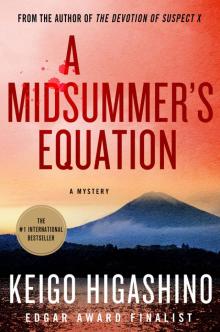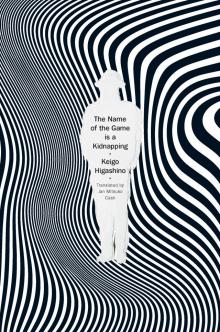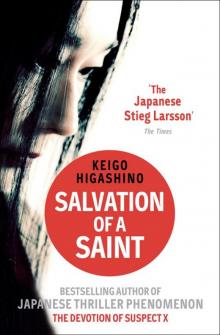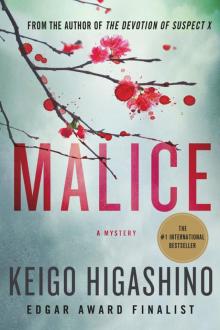- Home
- Keigo Higashino
A Midsummer's Equation: A Detective Galileo Mystery Page 22
A Midsummer's Equation: A Detective Galileo Mystery Read online
Page 22
“Hello? I’m sorry, but is this the Kawahata residence?” The voice belonged to a young woman. She sounded very polite.
“Yes, it is, may I ask who’s speaking?”
There was a pause, then the woman said, “Yes, my name’s Reiko Ozeki. Is Narumi home?”
Narumi immediately began flipping through faces in her head. It took about three seconds before she remembered.
“Reiko! Hi, how are you? It’s me.”
“I thought it was you! Your voice hasn’t changed at all. It’s been so long! How have you been?”
“I’m doing okay.”
The unexpected call from an old classmate lifted Narumi’s spirits for a moment, but then another premonition crept in. It’s been ten years. Why would she call now?
“It’s been so long, and I’ve been thinking I should give you a call, but I just never found the time. It’s been busy at work. You know, I’m working at a car dealership now.”
“Wow, sounds great,” Narumi said, bristling. You never found the time before, so why have you found it now?
“What’ve you been up to? I guess if you’re still at your parents’ house, you’re not married?”
“Nope. I’m here, helping out with the inn.”
“Oh, that’s good. Hey, have you heard? Naomi’s got two kids already. And her husband’s a total loser.”
They began talking about some of the other girls who had been in their tennis club, feeding each other with gossip and recent news. It was fun enough, but a voice inside Narumi’s head kept repeating the question, Why now?
She listened politely until Reiko asked, “So, how’ve things been with you? Anything new?”
“What do you mean, anything new?”
“I mean anything. You know, any fun surprises, random encounters?”
What are you getting at? Narumi thought, but she said “No, nothing really. Just life, you know.”
“Oh,” Reiko said. “Well, that sounds just like me, then. Oh, hey, look at the time. I’m sorry. You must be busy. I hope I didn’t interrupt your work too much.”
“No, it’s fine. I was just wrapping up for the night.”
“Look, I’ll call again soon. Hey, can you give me your cell phone number?”
They exchanged numbers and Narumi was half expecting her to hang up, when Reiko asked, somewhat hesitantly, “That was Ogikubo, right?
“Huh?” Narumi tensed. “What about Ogikubo?”
“Your house. You lived near the station, didn’t you?”
“Yeah, but what about it?”
“Oh, it’s nothing. Just, talking about old friends made me remember, but I wasn’t entirely sure, you know? Sorry. Anyway, talk again soon.”
“Yeah, thanks so much for calling,” Narumi said, waiting until she heard her hang up before she put down the phone. Her hand was shaking.
There was no doubt about it in her mind: someone had come asking Reiko questions. They wanted to know about Narumi’s middle school, about where she had been living. Whoever it was must have left an impression for Reiko to call like this out of the blue.
The police, Narumi thought. They’re looking into my past. Into Ogikubo. Her legs shook beneath her until it was too much for her to stand, and she had to crouch, steadying herself with one hand on the old front desk.
FORTY-TWO
By the time he reached Azabu Juban Station, it was a little after nine o’clock. There won’t be too many customers left by now, Kusanagi thought. Flower restaurant closed at ten.
He approached the building and looked up the outside staircase. A young man and woman were just coming down the steps. He waited for them to pass by before climbing the stairs.
Kusanagi opened the door and looked inside. The young man at the cash register looked up, then swallowed whatever he was about to say.
“Sorry, it’s me again,” Kusanagi said.
The young man nodded and looked into the back. Muroi was just coming out, wearing a red apron.
“I’ll be free in just a bit, if you don’t mind waiting,” he said.
“Not a problem,” Kusanagi said, sitting down at the nearest unoccupied table.
There were three groups of customers still seated. They looked mostly like businessmen, sharing the day’s news over beer and whiskey sours.
Kusanagi reflected on his last conversations with Yukawa. He’d spoken to the physicist twice today. The first time, he called in the early evening, using a number Yukawa had given him for the phone of “someone who is the most likely to be with me.” It had rung a few times before Yukawa had answered.
Kusanagi told him that while Shigehiro Kawahata had been posted in Nagoya, his wife and daughter had been living in a house in Ogikubo—the very same town where Senba had murdered Nobuko Miyake.
“Very interesting indeed. That puts the Kawahata family and Senba at the same spatial and temporal coordinates,” Yukawa had mumbled, half to himself.
“That may be,” Kusanagi said, “but I still have no way of finding out what the family was up to back then. You think you have a chance of finding some connection with Senba?”
“Hard to say, but I’ll give it a try,” the physicist had responded. “Given that Senba’s wife and Shigehiro Kawahata are from the same area originally, it might be that they just happened to run into each other at some point. But given that Shigehiro wasn’t in Tokyo at the time of Senba’s crime, it might be that the connection lies not with Shigehiro, but with his wife, Setsuko.”
“That’s a possibility. So, what’s Mrs. Kawahata like?”
“Well, if you’re picturing some old lady in the countryside, you couldn’t be further from the mark. She doesn’t wear much makeup, but she’s no bumpkin. Looks a lot younger than her age, too. I hear she left home young and was living on her own in Tokyo before she got married.”
The description did overwrite the mental image that Kusanagi had of Setsuko Kawahata. He also sensed that the physicist was driving at something. “A young, attractive woman living on her own in Tokyo … you think she might’ve been involved in the sex industry?” Kusanagi asked.
“I don’t get those vibes, but I’d say there’s a high possibility she was involved in some kind of customer service.”
“Okay, well, find out what you can,” he had said and hung up.
Then, about two hours ago, Yukawa had called him back. “It was a restaurant,” he said as soon as Kusanagi picked up.
“What was a restaurant?”
“Setsuko worked at a restaurant in Tokyo before she got married. That’s where she met Shigehiro Kawahata. Also, it specialized in Hari cuisine. Shigehiro probably went there for a taste of home.”
“And walked away with a lot more,” Kusanagi had said, when a light went off in his head, and he gasped out loud.
“What?” Yukawa asked.
Kusanagi licked his lips before saying, “Every once in a while, I get flashes of inspiration too.”
“This sounds interesting.”
“I’ll tell you when I know for sure,” Kusanagi said, giving the physicist a taste of his own medicine for once. He would’ve gone straight to Flower, but knowing it would be crowded, he’d decided to wait until closer to closing time.
Muroi walked over to the table, unfastening his apron. “Sorry to keep you waiting,” he said.
“Not at all. Sorry to bother you again,” Kusanagi replied. “There was something from our discussion yesterday that I want to check with you.”
“What, exactly? We talked about a couple things, as I recall.”
“You mentioned that the late Ms. Miyake and Senba used to talk about food from back home. You think they might’ve been talking about Hari cuisine, by any chance?”
“Hari?” Muroi put a hand to his forehead and thought for a moment, then he slapped his knee. “Yeah, there was a Hari place in Ginza they talked about going to. That’s where they got the present they brought me! It was dried noodles or something.”
“Seaweed udon, maybe?” Kusan
agi asked.
“Yeah, that was it. The noodles were pretty standard, except for the flakes of seaweed in them,” Muroi said, his face brightening.
That was confirmation enough for Kusanagi. Senba had been a regular at the restaurant where Setsuko worked. Not just Senba, but the late Nobuko Miyake, too, which meant Setsuko had probably seen her as well.
Just then, a text came in to Kusanagi’s phone. It was from Utsumi. He pulled up the message, and his eyes widened.
Found out where Senba is being hospitalized. Coming back now.
FORTY-THREE
Narumi hesitated as she walked. She knew she had to do something, but she wasn’t sure what. She poked her head into the kitchen. Setsuko was standing there, sharpening a knife. The clock on the wall showed it was already after ten.
“Mom?”
Setsuko almost jumped. “Hey, there. You startled me.”
“Where’s Dad?”
“Hmm? The bath, probably.”
Perfect.
“There’s something I wanted to ask you,” Narumi said hesitantly.
Setsuko put down a knife. There was no astonishment in her eyes, just cold resolve, as though she already knew what her daughter was going to say. “Yes?” she said, her voice barely a whisper.
“I just got a call from one of my friends back in middle school. It wasn’t about much, but at the end, she asked me about Ogikubo.”
Setsuko’s eyes narrowed. “Ogikubo?”
“Yeah. She just sounded like she wanted to make sure that’s where we lived. She didn’t say why. But I think I know.”
“And?”
The look of defeat on her mother’s face made Narumi’s chest ache. It was a sure confirmation that her suspicions were right, and any hope she might have clung to was false.
Desperately trying to keep any hint of tears out of her voice, she said, “Well, this is just a guess, but I think someone came to talk to her. Someone wanted to know where I was living in middle school. Probably the police.”
“Why do you think that?” Setsuko asked with an uncomfortable smile. “Maybe she just called you on a whim?”
Narumi shook her head. “I don’t think so. The timing’s too perfect.”
“What do you mean by that?”
“I heard from Nishiguchi that Tsukahara, the man who was killed, used to be a detective with the Tokyo Police Department. A homicide detective.”
The smile faded from Setsuko’s face.
Narumi continued. “And I heard something else from Mr. Yukawa about Mr. Tsukahara being spotted at a resort development in East Hari, where a murderer he arrested once used to live—I’m pretty sure he heard it from his friend in Tokyo homicide. I’m also pretty sure who the victim of that murder was.”
“Narumi,” Setsuko said, a severe look on her face. “We promised never to talk about that.”
“I think we’re past that point now, Mom. I don’t know what’s going on, but the police in Tokyo are moving on this. They’re looking into our family. Please, you have to tell me the truth. I know you know something. Why was Mr. Tsukahara here? What happened that night? What did Dad do?”
A look of anguish passed across Setsuko’s face. She lowered her eyes.
“Please,” Narumi said.
Setsuko looked back up, but before she spoke, she glanced over Narumi’s shoulder, and her eyes went wide. Narumi turned, almost fearfully. Her father was standing in a T-shirt and exercise shorts, a towel draped around his neck.
“Keep it down,” Shigehiro said, languidly, “or they’ll hear you all the way to town.” He walked in, leaning on his cane. He pulled a bottle of tea out of the refrigerator, poured some into a nearby cup, and drank it down with gusto. He appeared so calm that Narumi thought for a moment he actually might not have heard what they were talking about.
Setsuko was still silent, her eyes fixed firmly on the floorboards.
Shigehiro finished drinking his tea, then took a deep sigh. “Guess that’s it, then,” he said.
Narumi glanced at her father. “What’s it?”
“Shigehiro—” Setsuko began.
“You be quiet,” Shigehiro said in a gravelly voice. He turned a gentle smile to Narumi.
“There’s something we need to talk about. Something very important.”
FORTY-FOUR
Kusanagi arrived at the restaurant and found Utsumi sitting at one of the tables in the back. He waved off the hostess, who had come to greet him, and walked in.
Utsumi had been fiddling with her phone, but she put it away when she saw him approach. “I’m sorry,” she said. “I wasn’t thinking and sat in the no-smoking section. You want to move?”
“No, we’re fine right here,” he replied. “You get precedence tonight. You’ve been out questioning people all day.”
The waitress came up, and without looking at the menu, Kusanagi ordered coffee. Utsumi already had a coffee on the table in front of her.
“So, let’s have it. How’d you find him?”
“The traditional method. I started asking at every hospital in the Chofu Station area. I could eliminate any place that was outpatient only, which didn’t leave too many. When I showed Tsukahara’s picture to the receptionist at the fifth hospital, she told me she’d seen him visit several times.”
“Good work. Where was this?”
Utsumi produced a brochure from the Shibamoto General Hospital.
“It’s a medium-sized place. Notable because it has a hospice center.”
Kusanagi had been about to take a sip of his coffee, but he put it back on the table. “Senba’s in hospice? What is it, cancer?”
“The director of the hospital and his appointed physician were both out today, so I couldn’t get the details. But one of the nurses confirmed that Senba’s in hospice care. That would indicate late-stage cancer, or something close to it. She couldn’t tell me more.”
“Did you see him?”
Utsumi shook her head. “They don’t let anyone in other than family after 6:00 p.m. In this case, they’d been considering Tsukahara family, and the nurse mentioned that he’d paid for the hospitalization.”
“Was there some connection between Tsukahara and the hospital, then?”
“I’m not sure. One of the nurses did see Tsukahara speaking with the director on several occasions, and she thought they might be friends.”
Kusanagi took a sip of weak coffee and grunted. “Well, you might be right about Tsukahara having some pull there. The question now is, why did he go to such lengths to take care of Senba?”
“A very good reason,” Utsumi agreed, a hard light in her eyes.
Kusanagi crossed his arms and leaned back in his chair, looking at her. “You’re thinking something, aren’t you? You’ve got an idea, vague though it might be.”
“I’m guessing you do too, Detective Kusanagi.”
Kusanagi snorted. “Okay, stop acting all important and get on with it. What’s your amazing theory?”
“There’s nothing amazing about it. It’s just what Tatara said. Tsukahara had Senba’s case on his mind. The case might have been officially closed after the arrest, but there was some deeper truth that remained uncovered, and Tsukahara knew it.”
Kusanagi rested his arms on the table and looked up at the younger detective. “A deeper truth, eh? So let’s hear it.”
Utsumi hesitated for a moment before brushing back her hair and shaking her head. “I don’t believe in wild speculation without solid evidence.”
Kusanagi chuckled and scratched his lip beneath his nose. “That’s probably a good policy, but maybe I can give you a little help on the evidence front.” He glanced around and said, more quietly, “I found out where Mrs. Kawahata and her daughter were living. The exact address is still a mystery, but I know the station they lived near: Ogikubo.”
Utsumi’s eyes gleamed.
“The Kawahatas were involved in that case sixteen years ago—there’s your deeper truth. As to how they were involved, well, I ha
ve a guess,” Kusanagi said, adding with a grin, “Of course, that would be wild speculation.”
FORTY-FIVE
Kyohei was busily removing a mountain of mud with his hands. He attacked it with vigor, both arms flailing, yet no matter how hard he worked, the mud only piled higher and higher, outpacing his efforts.
The pile was towering over his head when it started to change shape into a more familiar, humanlike form. It’s going to chase me. Kyohei ran—or tried to run, except his feet wouldn’t budge. He crouched, and the mud-man peered down at him. Don’t look at his face. Kyohei shut his eyes. Then he felt it pressing into him, the mud-man’s face pushing into his own until it became difficult for him to breathe. Still, he kept his eyes shut.
I won’t open my eyes, I won’t—
Finally he couldn’t stand it any longer, and he let his breath out. The feel of the mud against his face changed, turning to something softer.
Fearfully, he opened his eyes to see he was in his room. His head had slipped from the pillow, and he’d been sleeping with his face buried in the folds of his futon.
What a crazy dream.
He got up slowly. His pajamas were clingy with sweat.
Still a little groggy, he grabbed his phone off the table and checked it, a little surprised to see it was almost eleven in the morning. He hadn’t slept in like this once since coming to Hari Cove.
He got dressed and stepped out of his room. He was hungry. He made his way down the elevator to the first floor and was heading for the dining room when he stopped. He had almost forgotten what time it was. Yukawa would have finished his breakfast ages ago. He cut across the lobby and made for the family apartment, when he heard someone talking. Kyohei stopped again, remembering the overheard conversation from the night before.
Stepping quietly, Kyohei approached the door. He was about to put his ear up to it and eavesdrop when he heard a voice say, “And how did that happen?” Kyohei almost jumped. The voice sounded exactly like someone he knew very well, someone who couldn’t possibly be inside the apartment.

 A Midsummer's Equation: A Detective Galileo Mystery
A Midsummer's Equation: A Detective Galileo Mystery The Devotion of Suspect X
The Devotion of Suspect X Journey Under the Midnight Sun
Journey Under the Midnight Sun The Name of the Game Is a Kidnapping
The Name of the Game Is a Kidnapping Salvation of a Saint
Salvation of a Saint The Miracles of the Namiya General Store
The Miracles of the Namiya General Store Malice: A Mystery
Malice: A Mystery